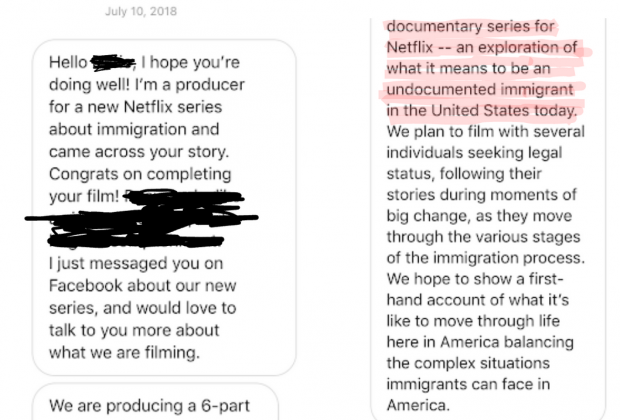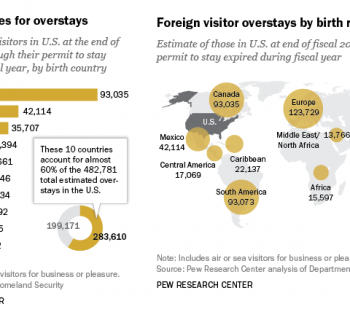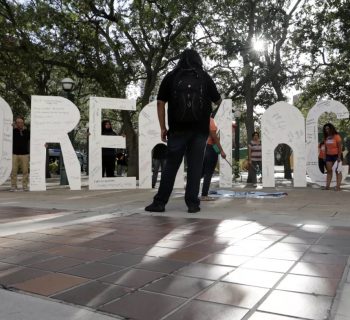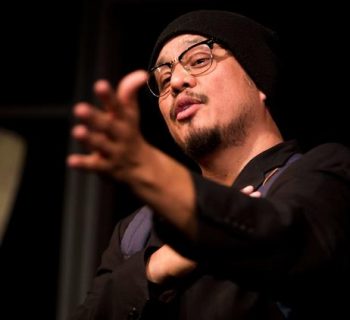By: Undocumented Filmmakers Collective, Medium – Dec 6, 2019
Our story as undocumented immigrants continues to be the focus of media frenzy, particularly as the Trump administration carries out its harmful xenophobic measures. Too often, media-makers who do not come from our community scout for stories that they can display in their next project, acquire resources to produce their work, and receive accolades along the way. Rarely, however, do we get called on as equal collaborators in such projects, much less get the support we need to create our own projects. If anything, the media industry has systemically excluded undocumented media-makers from pursuing our craft by disqualifying us from resources and opportunities due to our status, in spite of its implicit claim to uphold the dignity of immigrants by telling our stories.
This trend has recently manifested itself through the production of the Netflix documentary series, Living Undocumented, executive produced by Selena Gomez, Aaron Saidman, and Eli Holzman. Now nominated for an International Documentary Association Award for best episodic series, the program’s production value and reach demonstrates what can happen when resources are invested in a project by powerful platforms. While the series has gained traction for its portrayal of a timely issue, Living Undocumented also serves as an example of the inequity at play when it comes to telling the stories of undocumented immigrants in this country.
In 2018, producers from the series reached out to different immigrant rights organizations and undocumented activists (including those of us who are penning this statement), in hopes of identifying individuals to film. Their outreach message described the series as “an exploration of what it means to be an undocumented immigrant in the United States today.” Their inquiry follows:
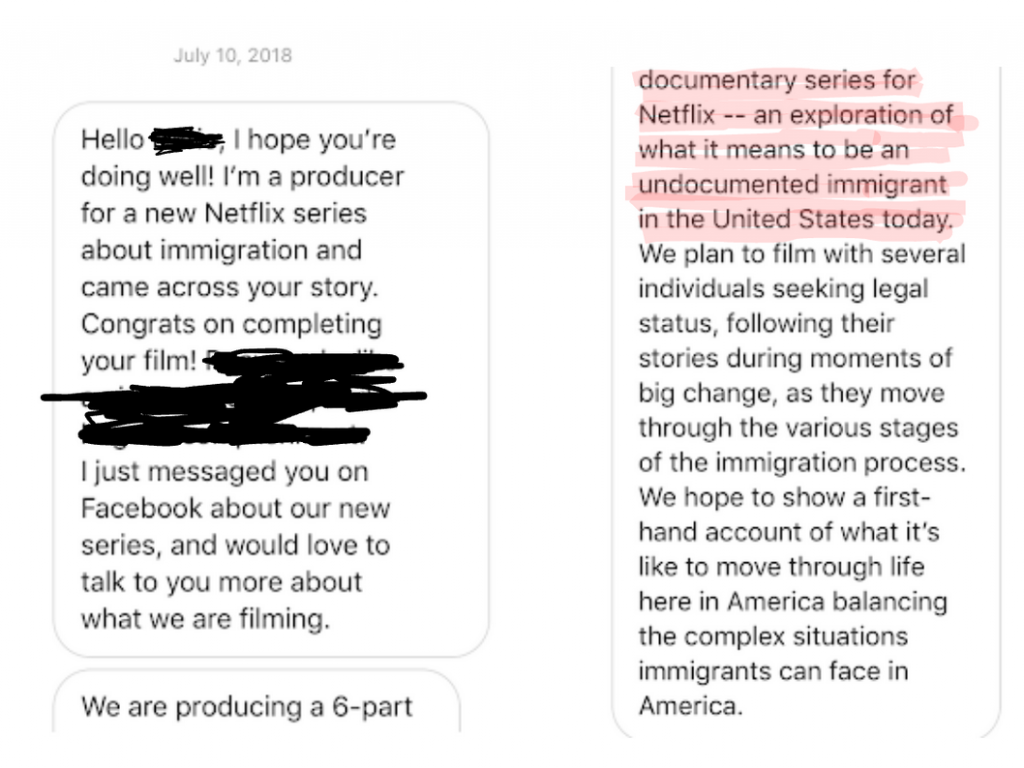
Considering the nature of this production, this is an ideal opportunity to include the skills and perspectives of undocumented media-makers in developing this project. However, after asking a producer if they could hire an undocumented filmmaker, we were reminded of the exclusion we continually face in our field. (Screenshot below.)
Describing the series, the Hollywood Reporter writes: “Netflix will put human faces to the immigration debate” as if this series is doing something revolutionarily new and the works of undocumented media-makers over the last decade do not exist. From the early documentaries of Tam Tran to the modern-day web-series Undocumented Tales by Armando Ibañez, there is no shortage of media about the undocumented immigrant experience created by talented undocumented filmmakers. Where the shortage exists, however, is in the opportunities and resources provided for undocumented filmmakers and our community-driven productions.
 This incident is a symptom of a larger problem in the field of media creation. #DecolonizeDocs and #DocsSoWhite are ongoing campaigns that critique the field of documentary, and we raise our voices now to add to the fight. The indigenous Maori scholar, Linda Tuhiwai-Smith, provides crucial perspectives that speak to analogous issues. In her book, Decolonizing Methodologies, she reflects on the relationship between indigenous communities and Western research practices (rooted in colonization) which parallels how mainstream media films undocumented narratives. Tuhiwai-Smith says, “Many researchers, academics and project workers may see the benefits of their particular research projects as serving a greater good ‘for mankind’, or serving a specific emancipatory goal for an oppressed community… [But it only told us, the indigenous world] things already known, suggested things that would not work, and made careers for people who already had jobs.”
This incident is a symptom of a larger problem in the field of media creation. #DecolonizeDocs and #DocsSoWhite are ongoing campaigns that critique the field of documentary, and we raise our voices now to add to the fight. The indigenous Maori scholar, Linda Tuhiwai-Smith, provides crucial perspectives that speak to analogous issues. In her book, Decolonizing Methodologies, she reflects on the relationship between indigenous communities and Western research practices (rooted in colonization) which parallels how mainstream media films undocumented narratives. Tuhiwai-Smith says, “Many researchers, academics and project workers may see the benefits of their particular research projects as serving a greater good ‘for mankind’, or serving a specific emancipatory goal for an oppressed community… [But it only told us, the indigenous world] things already known, suggested things that would not work, and made careers for people who already had jobs.”
We can only wonder what the real intentions of media-makers are when they embark on these projects about undocumented immigrants. Is it really to benefit the undocumented community? Or simply to benefit their own careers? For undocumented filmmakers, Living Undocumented’s production methodologies unfortunately create nothing but more inequity. For the undocumented protagonists featured in the film, we think about the practice of extracting their stories without critically thinking about compensating them. More importantly, who takes care of their well-being after sharing deeply emotional and critical moments? Considering their legal status, were the protagonists and their immigration lawyers also able to view and approve edits of the film, as it pertains to their safety as undocumented immigrants?
All we see is sensationalism and misrepresentation of a community that has been fighting against the harmful narrative of the “good vs bad immigrant”. In the series’ first episode, a protagonist is described by his business partner as “the poster boy for who we want to immigrate here.” This highlights how disconnected the producers and crew are from the evolving messaging coming from the undocumented community. We are more than poster children for immigration. That’s why it’s important to have those directly-impacted also participate behind the cameras, during production and post-production in order to create a body of work that provides nuanced perspectives.
Our undocumented community does not need any more empathy through films created for mainstream American audiences, or as Toni Morrison describes it: The White Gaze. What we need is genuine solidarity so that we can thrive by creating change from within our own communities — and in our case, creating media about us, for us, by us. What we aspire for are representations of our community that do not just dwell in the trauma, but also celebrate the complexities of our human experiences. What we need are stories that contextualize our lives within bigger systems without regurgitating narratives that overly politicize our existence. In an effort to hold the series producers and broader industry accountable, we present the following demands:
DEMAND 1: APOLOGIZE
Producers of Living Undocumented will make a public apology. Producers will have an opportunity to inform the public that their approach to exclude undocumented filmmakers without doing due diligence to research how to hire them was misguided.
DEMAND 2: COMPENSATE PROTAGONISTS AND DONATE TO GRASSROOTS ORGANIZATIONS
Donate profits made from the series to grassroots organizations working to protect undocumented communities. The protagonists of the film should also receive compensation for their participation in this project (if they have not already).
It is important for documentary filmmakers to think more critically about the idea of “compensation,” “objectivity,” and “journalistic ethics.” When interviews are filmed in a studio, there is an expectation to pay for the rent and electricity to use the space. But when interviews are filmed in the homes of protagonists, the expectation to compensate them for providing their space and resources to the film crew is questionable. Similarly, while news archival footage could cost hundreds of dollars by the minute, photos and archival footage provided by protagonists are not given reimbursement. Especially for protagonists that come from working class backgrounds, producers must be more critical in how their filmmaking practices impact the material needs of the people that they claim to uplift.
DEMAND 3: HIRE UNDOCUMENTED FILMMAKERS
There is a misconception in the entertainment industry when it comes to hiring undocumented people. Every person in the United States, regardless of immigration status can apply for a Tax ID Number (TIN) to file their taxes. Undocumented immigrants can become independent contractors or freelancers by using a TIN. Some undocumented immigrants have also received Deferred Action for Childhood Arrivals (DACA) and consequently have a social security number that allows them to work as full-time employees or independent contractors. Many productions often hire full-time employees and independent contractors, and alternatives like DACA and independent contracting can expand opportunities to include undocumented immigrants behind the scenes,
Immigrants Rising created a resource called “5 Tips to Get Started as an Independent Contractor” to support undocumented people to advance their professional careers. This document is a helpful resource for undocumented people but, also, for producers to understand the hiring process of undocumented filmmakers that become independent contractors.
DEMAND 4: EXPAND FUNDING OPPORTUNITIES FOR UNDOCUMENTED FILMMAKERS
The exclusion of undocumented persons extends into different sectors. Foundations and grants are also a hurdle for undocumented storytellers. Immigrants Rising created a document called OVERVIEW OF GRANTS TO INDIVIDUALS (FOR PUBLIC CHARITIES & PRIVATE FOUNDATIONS/FUNDERS) which “provides an overview of the process by which public charities and private foundations can make grants to individuals.” Funding opportunities pave the way for undocumented filmmakers to advance our projects and share the stories of our communities.
The documentary industry is ever-evolving, and it is the field’s responsibility to assess how to fill in the critical gaps. When it comes to hiring undocumented filmmakers, legal argument tends to be the focus of the discussion, but what’s legal is not always moral. As Martin Luther King, Jr. wrote in his Letter from Birmingham Jail: “One has not only a legal but a moral responsibility to obey just laws. Conversely, one has a moral responsibility to disobey unjust laws.” In holding the industry accountable, producers must take tangible steps toward figuring out how filmmakers, regardless of immigration status, can be hired for any productions in the media industry if it were to be the inclusive field that it claims to be.
Undocumented media-makers will not be erased in the conversation around the issues affecting our community, families, and very lives. We demand a new system of telling the stories of our community. At a time like this, a production like Living Undocumented is a significant opportunity to transform the narrative status quo about us in this country, which makes it that much more important for us to lift our voice about this series. Being undocumented, we have been forced to adopt alternate modes of thinking, not only for comfort in our times of uncertainty, but for survival as we invent ingenious solutions to overcome our problems and thrive. We take ownership on how we can focus this perspective on to the issues that envelop us and communicate them in our way. Only then will we be able to truly let the audience into our lives. Only then will we invite solidarity, because we will no longer be represented in misery, merely gazed at with empathy. Instead, we will be seen through our own eyes, with a nuanced understanding of our very own experience.
Written by the Undocumented Filmmakers Collective, Medium
For more info, contact: undocufilmmakerscollective[at]gmail.com

